Edgar Allan Poe was born on January 19, 1809 in Boston, and later died under very mysterious circumstances when he was just 40 years of age. This famous writer and poet created several legendary works, such as “The Murders in the Rue Morgue,” “The Raven,” and “Annabel Lee.” His poems and short stories still appeal to readers to this very day.
The mystery surrounding his passing began on October 3, 1849 when a stranger found Poe semi-conscious in a tavern in Baltimore, which was also the location of a polling site. Unfortunately he never regained enough consciousness to explain what happened to him and Poe passed away just four days after being found.
There have been many theories over the years as to what caused Poe’s death, such as rabies, alcohol, brain tumor, and even murder. Nobody really knows the exact cause of his passing which is also why so many people are still fascinated with this huge mystery surrounding one of the greatest writers of all time. This list will detail 10 strange facts about Edgar Allan Poe’s tragic death.
10. He was advised not to travel
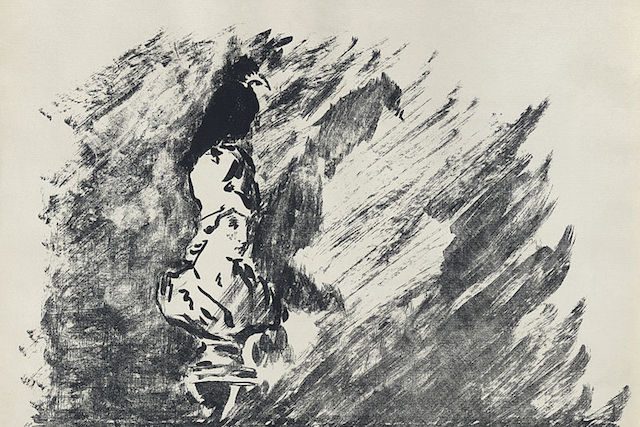
One week prior to his death, Poe visited with his doctor friend, John Carter, who advised him not to travel. He was scheduled to travel to Philadelphia to edit a poetry book written by the poet Mrs. St. Leon Loud. However, the night prior to him leaving, Poe’s fiancée, Elmira Shelton, noticed that he looked ill, so he went to see his doctor, who suggested that he remain in Richmond a few more days before taking the journey to Philadelphia.
Poe wrote a letter to the female poet stating that circumstances beyond his control would prevent him from traveling and he would have to postpone the trip. The letter is now on display at the Poe Museum in Richmond, Virginia.
9. He could not remember where he put his luggage
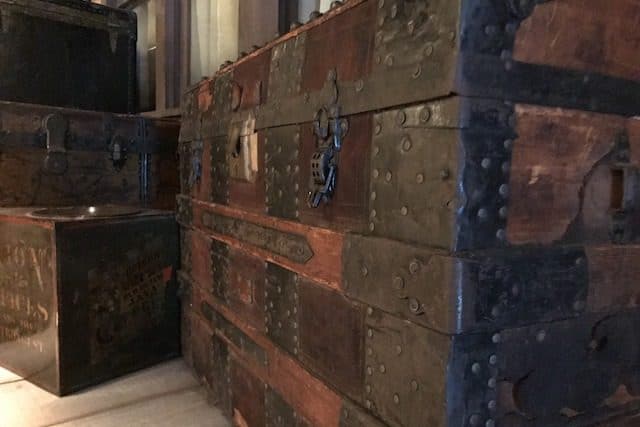
When John Moran (who was Poe’s attending physician at the hospital prior to his death) asked him where he had left his luggage, Poe was unable to recall its whereabouts. Several weeks after his death, his cousin located a trunk that held Poe’s possessions in Baltimore, while a second trunk was located in Richmond.
Poe’s sister and mother-in-law argued over who was going to get the trunk, while his manuscripts ended up going to his literary executor and editor Rufus Griswold. The trunk is now one of the many items on display at the Poe Museum.
His inability to think clearly actually began prior to his departure for his scheduled trip to Philadelphia. His fiancé noticed that he seemed to have trouble thinking clearly (along with looking ill) and that’s when he went to see his doctor. Oddly enough, when Poe left the doctor’s office, he grabbed the doctor’s walking stick instead of his own, which seemed to be another example of him not thinking clearly.
8. The circumstances in which he was found
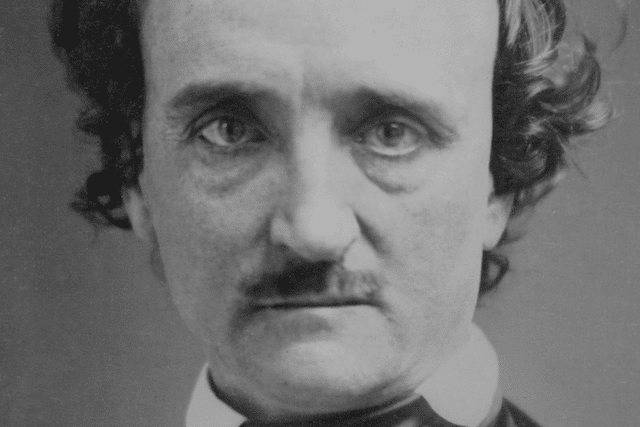
On October 3, 1849, a stranger found Poe semi-conscious in a tavern in Baltimore, which coincidentally (or not… we’ll get to that in a minute) was the location of a polling site. Joseph W. Walker, the man who found him, arrived at Gunner’s Hall when he discover a man dressed in ratty second-hand clothing laying in a gutter looking delirious.
When Walker asked him if he knew anybody in Baltimore that could possibly aid him, Poe mentioned Joseph E. Snodgrass, who had medical training and was also a magazine editor. Walker then wrote Snodgrass a letter explaining that Poe was “in great distress, and… in need of immediate assistance.”
Poe was taken to the Washington Medical College but died just four days later. Apparently, the night before he passed away, he was said to have called out the name “Reynolds,” although nobody would ever figure out who this mysterious person was. Unfortunately Poe never regained enough consciousness to explain what happened to him and the strange circumstances leading up to his death are still a mystery to this day.
7. He may have been a victim of “cooping”
The “Cooping Theory” is a popular hypothesis and many believe that Poe could have been a victim of this horrible crime. There was a municipal election on the exact day that he was found delirious outside of a Baltimore tavern, which was also used a polling station. The association between that location and “cooping” is no coincidence.
The cooping process was a form of voting fraud which involved several unsuspecting victims who were either given large amounts of drugs and/or alcohol, then they would change into many different outfits/disguises and vote several times for a certain political candidate. When they were done, the delirious victims would be left for dead or even murdered. Since Poe was found wearing scruffy clothing that were obviously not his own, and since he was so incredibly delirious, this was definitely a very possible theory as to what happened to him.
6. His enemy wrote his obituary
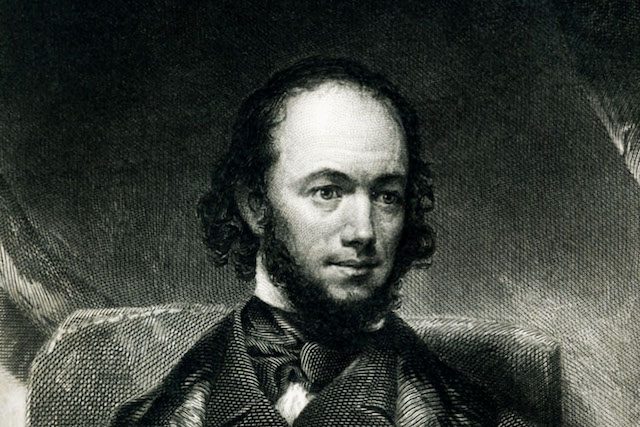
While obituaries are normally written by family members of a loved one, Edgar Allan Poe’s obituary was, surprisingly, written by his enemy Rufus Wilmot Griswold. As a matter of fact, in the first paragraph of the obituary, Griswold wrote “Many will be startled, but few will be grieved by the news. He had very few friends, and he was the friend of very few – if any.”
It’s pretty obvious that Griswold had a huge grudge against Poe and used his death as a way to ruin his reputation. Griswold and Poe’s mother-in-law made a deal where he would edit the posthumous edition of Poe’s writings, in which he had the opportunity to completely sabotage the deceased writer’s reputation by deceivingly titling the work “Memoir of the Author.” Griswold forged letters and made up facts about Poe’s life, which included claims that he betrayed his friends and deserted the army, just to name a few of the many made-up stories which were eventually all proven to be false claims.
5. Was he or wasn’t he drinking?

When Poe was found delirious and in really bad shape at a tavern, the automatic theory was that he was drunk. And since he had a reputation for drinking heavily and going on alcohol binges, it was a safe assumption. However, after being brought to the hospital and after the doctor examined him, alcohol may not have been a contributing factor to his death and he may not have been drinking at all. In fact, at the time of his death, Poe had joined a temperance society for people who were refraining from alcohol.
John Moran, who was a physician at the hospital, believed that Poe hadn’t consumed any alcohol prior to his passing. While in the hospital, he drifted in and out of consciousness and while he was awake he would hallucinate and make no sense when he spoke. He would also appear to recover a little bit before getting worse and ultimately passing away, which was not consistent with the symptoms of alcohol withdrawal.
4. Only seven people attended his funeral
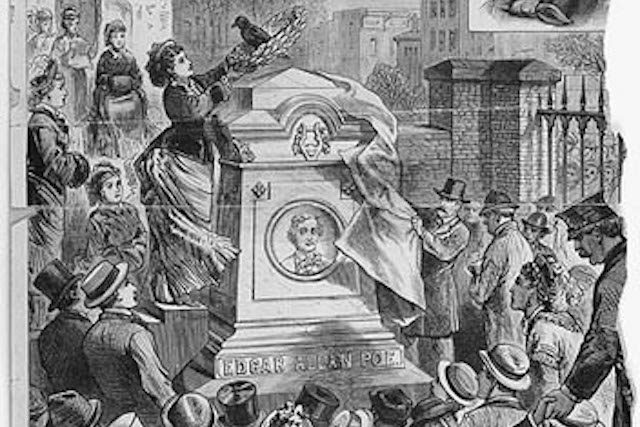
With Poe’s dying words “Lord, help my poor soul,” the tragic ending to his life got even sadder when only seven people showed up to his funeral. Apparently his cousin, Neilson Poe, didn’t let anyone know that the famous writer had passed away. What’s even more heartbreaking is that so few people showed up that the priest didn’t even give a sermon; therefore, the entire ceremony from start to finish lasted just three minutes. Oddly enough, when he was lying in state, some of his fans who wanted a souvenir of the poet actually took locks of his hair.
Poe did, however, finally get the funeral he very much deserved and had waited a long time to receive. In 2009, 160 years after he had passed away, he received a very honorable funeral in Baltimore. A life-size recreation of his body was carried in a horse-drawn carriage starting from his former home and brought to the Westminster Burying Ground. Although 700 tickets were sold, it is said that thousands were in attendance for the beloved author’s long awaited proper burial.
3. Final resting place
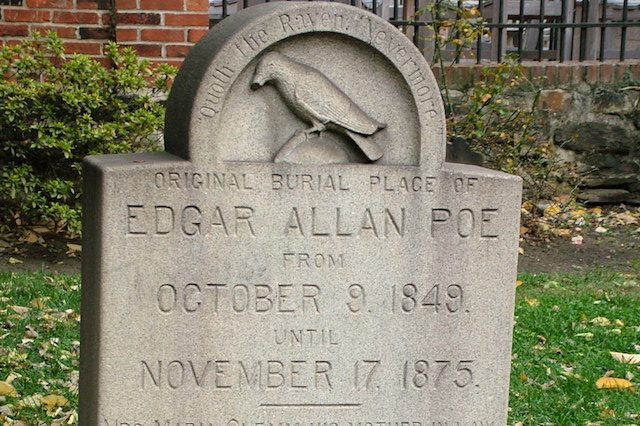
Poe was initially buried in his grandfather’s plot in an unmarked grave at Westminster Burying Grounds in Baltimore. Several years later, his cousin Neilson ordered a marble headstone but while it was under construction, a train crashed into the stone carver’s shop and destroyed the stone. He never ordered another one.
Many years later, a proper and very prestigious monument was designed for the deceased poet. In fact, it was designed by George Frederick, who also designed City Hall in Baltimore. Since the monument was too big for the original burial site, it was placed at the front corner of the cemetery. A year later, in November 1875, his body was moved to his new resting place. Then in 1913, another stone was placed at the original unmarked location where Poe had initially been buried, although it is said that the stone is not in the correct location.
2. He died just ten days before his wedding
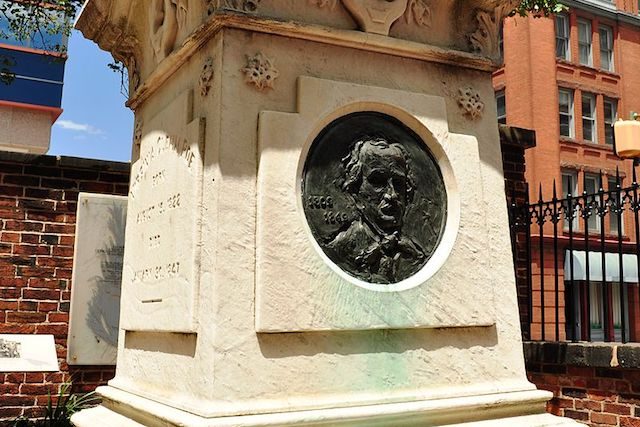
Poe was engaged to Elmira Royster Shelton when he died. They had initially been engaged 22 years earlier but their engagement was broken by her father when she was 18 years of age. Elmira was said to have been one of the greatest influences in Poe’s life and was the inspiration for many of his poems. After both of their spouses died, Poe and Shelton renewed their relationship and became engaged again. But tragedy struck again and Poe passed away just 10 days before their wedding was set to take place.
After Poe’s death, Shelton was very reluctant to speak about her fiancé, although she was asked numerous times for interviews, which she declined. In her later years, she finally agreed to an interview with John Moran (the doctor at the hospital where Poe had died) for his book titled A Defense of Edgar Allan Poe. Shelton passed away in 1888 and her obituary read, “Poe’s First and Last Love.”
1. He may have been murdered

Author John Evangelist Walsh presented another possible theory on Poe’s death in his 2000 book titled Midnight Dreary: The Mysterious Death of Edgar Allan Poe He suggested that Poe may have been in fact murdered by the brothers of his fiancé Elmira Shelton.
Walsh’s theory was based on evidence gathered from letters, memoirs, and newspapers, in which he claims that Poe in fact made the trip to Philadelphia but was confronted by his fiancé’s three brothers, who threatened him against marrying their sister. He then hid out in Philadelphia for almost a week prior to returning to Richmond to marry Shelton but the brothers again found him and stopped him in Baltimore. Walsh then speculates that the brothers beat Poe up pretty badly and then forced him to drink whiskey.
This is, of course, only one of many theories, but it is as much of a possibility as any of the other hypotheses.
2 Comments
If the brothers beat him up, why would they bother putting him in ratty clothes? It seems that last theory is the least likely for that reason.